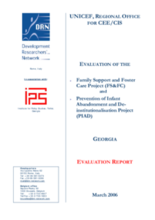In Georgia, the recently reformed child protection projects “Prevention of Infant Abandonment and De-institutionalisation” (PIAD) and “Family Support and Foster Care” (FS&FC) share a two-fold objective. On the one hand, they aim at preventing additional children from entering residential care, and at deinstitutionalizing children that are already there, by: (i) addressing the causes of child abandonment, and (ii) creating family-based alternatives to institutional care. On the other hand, they intend to provide a model to encourage the adoption of family and community-based child protection policies at national level.
These projects represent the first effort to introduce alternative child care services in Georgia. Since they are small scale initiatives, this cannot be expected to make a significant difference in reducing the number of children in institutions. From UNICEF perspective, therefore, the relevant evaluation question is what contribution the projects are making towards the development of a full-fledged gatekeeping system in Georgia. In particular, the evaluation discussed: 1) whether the two projects have succeeded in establishing good practices in gatekeeping, which can have a demonstration effect and be scaled-up; and 2) whether they managed to influence government policies towards adopting a family and community-based approach to child protection.
This evaluation of the FS&FC project and the PIAD project demonstrates the introduction of elements of practice that constitute the basis for the development of a full-fledged gatekeeping system in Georgia, including the first cadre of social workers in the country, sound case management practices, and standards for child care services that are becoming the basis for national ones. The multidisciplinary decision-making panels created at regional level constitute one of the promising practices pioneered by the FS&FC project, establishing a mechanism for transparent decisionmaking in the best interest of the child. The PIAD has introduced innovative practices to handle the complexity of needs of beneficiaries, including shelter and employment support.
In order to build on the results of the two projects and work towards a full-fledged gatekeeping system in Georgia, a number of challenges will have to be addressed. The definition of institutional mandates and accountabilities for the provision of various types of services is still in progress, and there is no clear indication of which services the government would deliver and which ones would need to be outsourced. In the meantime, priority needs remain unmet, such as day care centres, or services for disabled children. The hasty closure of institutions before such alternative services are in place may have a negative impact on child welfare. Weak inter-agency cooperation, and, particularly, the insufficient government involvement, are preventing the development of an effective referral system. In addition, existing mechanisms for public funding to institutions, and the lack of employment alternatives for staff, still provide incentives to institutionalisation. The cultural resistance of institutions’ staff constitutes a major obstacle for gatekeeping.
©The Development Researchers Network and The Institute for Policy Studies

